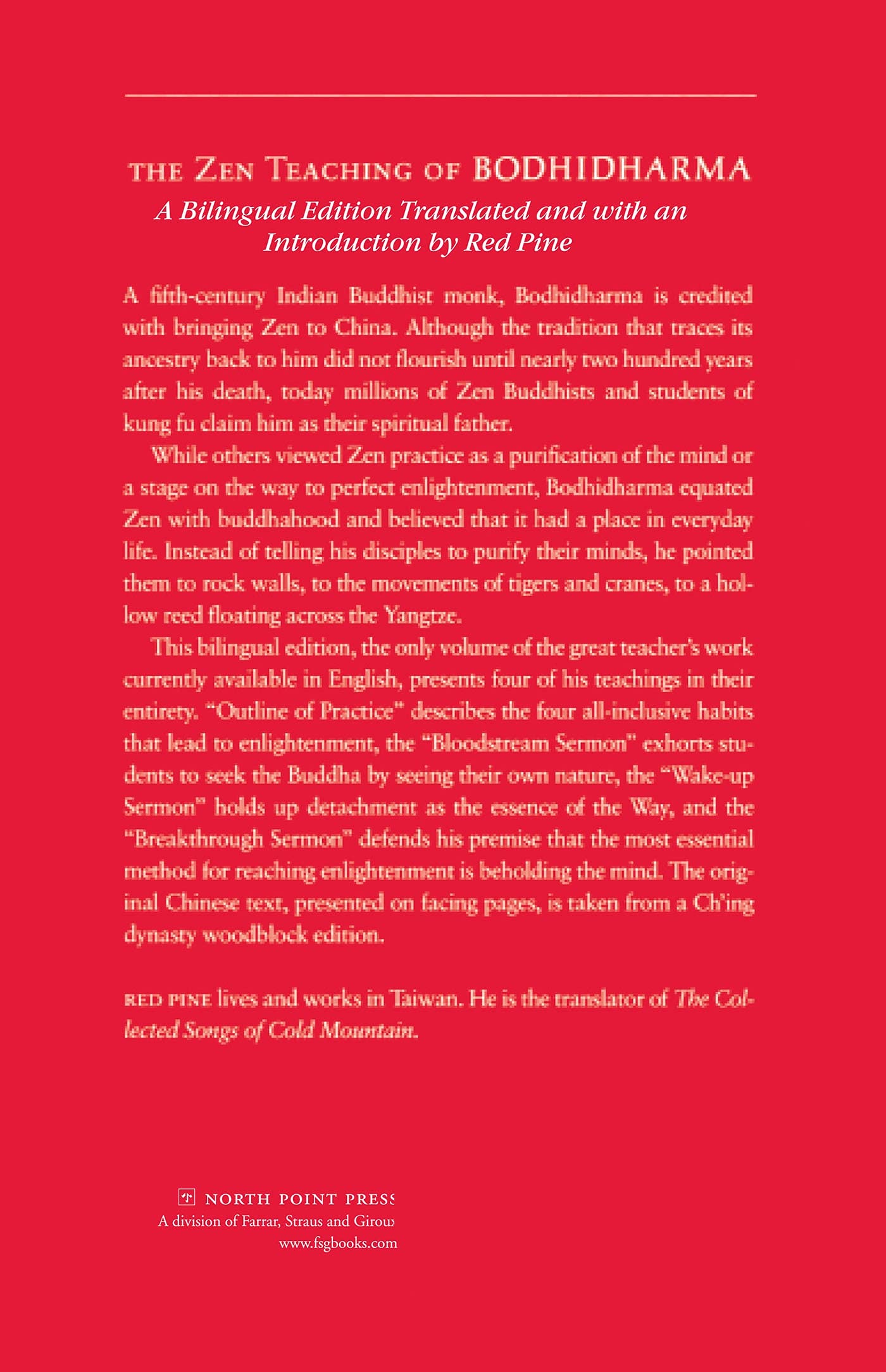


Full description not available
K**N
A Great Read📖
The Zen Teaching of Bodhidharma is a profound yet compact book that dives into the essence of Zen. It contains the teachings of Bodhidharma, the legendary monk who brought Zen to China. The book is minimalistic—no fluff, just direct, thought-provoking wisdom. It challenges the reader to look beyond words and seek understanding through experience.The translation is clear, but the text itself can be dense, requiring deep reflection. If you’re looking for practical Zen advice, this may not be a step-by-step guide. However, if you appreciate raw, unfiltered spiritual insight, this book delivers. It’s a short but powerful read, perfect for those interested in Zen’s core philosophy. A must-have for serious seekers of enlightenment.
J**L
Brilliant...but beware of one stumbling block!
Within the text we are no doubt given Bodhidharma's "marrow of Zen" and although he is known to have been a formidable presence, we receive the teaching without the infamous shouts and sticks of subsequent iconoclastic teachers like Lin-chi, Yunmen, Hakuin, et al. Yet, as pure as these teachings are, I encountered a disturbing stumbling block along the way that reminded me of a Tibetan saying about mixing gold dust with yak dung and how even gold dust can be blinding if it sticks in the eye.Specifically, given that Buddhism has a strong prohibition against killing sentient beings, and proclaims that all sentient beings have an innate potential for realizing enlightenment or liberation, what are we to make of Bodhidhama's quote from the Mahaparinirvana Sutra on page 37? Here he agrees with the passage, "Since icchantikas are incapable of belief, killing them would be blameless." Icchantika is a Sanskrit term referring to the most base and spiritually deluded of all types of being.We could simply choose to dismiss it as an inconsistency and move on, or we can defer drawing any conclusions until we first explore the historical background leading to this inclusion in Bodhidharma's teaching. I have opted for the latter choice.Perhaps we can use the rationale that ancient Zen teachers often used shocking and sometimes violent hyperbole merely to make an impression on their students, e.g., Lin-chi's oft-quoted, "Followers of the Way...never be misled by others. Whether you're facing inward or outward, whatever you meet up with, just kill it! If you meet a buddha, kill the buddha." Obviously, this is a metaphor referring to not becoming attached to conceptual obstructions. No true follower of the Way would interpret the quote literally.In Scripture, however, we find two different perspectives on icchantikas. Bodhidharma is apparently quoting from the shortest version of the Mahayana Mahaparinirvana Sutra translated by Fa-xian (416 C.E.). The full-length Dharmakshema version of the Mahayana Mahaparinirvana Sutra, (421 C.E.) in contrast, takes the position that since all phenomena are impermanent, even the icchantika, has the potential to change and eventually attain liberation. Other scriptures, such as the Lankavatara Sutra, also suggest a similar perspective. Thus, I can only conclude that the concept of the irredeemable icchantica was a short-lived cultural phenomenon, since the term doesn't appear elsewhere in Buddhist scripture. Comments from other reviewers would be most welcome.
N**Y
Possibly the most valuable book I've ever owned, for many reasons.....
This is a wonderful book, containing sermons from ancient Ch'an sifu Bodhidharma (or someone else..it really doesn't matter) ....I gotta say, I love all of them, mainly because they're all concise and to the point, but the "Wake-up" sermon is worth building a life around.The author/speaker gives useless (and exclusionary and divisive) questions from attending monks short shrift (I paraphrase): "How can someone possibly create karma by butchering for meat and still become a Buddha?" Bodhidharma's answer: ""I only talk about seeing your nature"."Another was: "These laymen have sex all the time, how can THEY possibly become buddhas?" Answer: "I only talk about seeing your nature".Red Pine has given the world a gift, that stands with the Dhammapada in its elegant simplicity.That said, those poor folks who require ritual, hierarchy, pecking order and the trappings and minutiae of organized religion to give their lives meaning will ignore it..There's not much here to argue, discuss, pick-apart, write theses on, etc, etc...ad infinitum.Why we have chosen to muddy the waters of such a razor-sharp, perennial and crystal clear philosophy as Gautama's seems to have been ("Correct your mental defects through your own efforts") is beyond me.This book is a welcome reminder for me to return to simplicity.
C**E
The Zen Teachings of Bodhidharma
"The Zen Teachings of Bodhidharma"This writing got through to me in an unusual waySimple and meaningful.Not plugged with concepts unfathomable.In all my 70 years of reading, Bodhidharma is a standout.I urge you to read it and be open to awareness!
B**L
Zen
Very easy to read and understand
Trustpilot
1 month ago
3 weeks ago